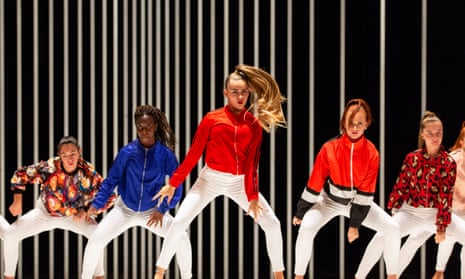Dancer and choreographer Oona Doherty’s Hard to be Soft: A Belfast Prayer is about the toughness of her hometown; the carapace of swagger and sass, rage and resilience built up by men and women in a place where the conflict seems intractable and horizons are limited by constrictions of class and religion.
Playing out within a large illuminated cage and divided into four chapters – Lazarus and the Birds of Paradise, Sugar Army, Meat Kaleidoscope and Helium – this deeply humane and superbly crafted work begins and ends with solos for Doherty.
Dressed in a baggy white T-shirt and jogging bottoms, her hair scraped back into a small bun, she embodies an instantly recognisable type of hyper-masculinity: squaring up, staring down; a casual cock-of-the-walk stance, hands unabashedly stuck down waistband, that morphs into a back-bending, fist-flailing surge of fury.
Set against a soundtrack of recorded Belfast voices and soaring liturgical music, Doherty’s gestural physical language is compellingly stark and subtle. She makes fluently legible phrases from small shrugs of dismissal, squinty drunken staggers, a curl of the lip or slump of resignation. It’s movement that neither sanctifies nor sneers at this kind of machismo. Instead, it’s potently empathetic: Doherty’s form of physical prayer makes visible the violence and hidden vulnerability inherent in a community that doesn’t usually feature on the contemporary dance stage, while articulating emotional truths that exist across cultures.
In the duet Meat Kaleidoscope, a topless father and son’s bulky bare flesh renders them simultaneously exposed and intimidating. With torsos mashed together and arms entangled, their feet remain resolutely far apart: it’s a poignant portrait of emotional diffidence and inherited trauma that speaks to anyone with experience of a depressed or angry dad. The Sugar Army section, meanwhile, demonstrates a particular feminine energy to counterpoint the brawling maleness. Thirteen teenage dancers in white jeans and colourful tracksuit tops, bolshy but immaculately groomed, serve a swagger of their own as they perform a kind of hip-hop inflected haka, a tribal dance punctuated by swift ponytail readjustments. Sensitive yet unflinching, raw and richly choreographed, Doherty’s dance is a major achievement.
At the Lyceum, Edinburgh, until 24 August. Then at the Southbank Centre, London, on 11 October.

Comments (…)
Sign in or create your Guardian account to join the discussion